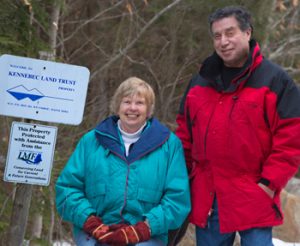On a bright Saturday afternoon in January, Mary Bayer stirs homemade carrot soup in her log home just a few paces from Lovejoy Pond, in the central Maine town of Fayette. Nearby, her husband Leon Bresloff loads logs into a wood-burning stove set into a dramatic two-story chimney built from massive granite stones.
 The quiet of this day belies years of intense work filled with care, concern, and travel — work that doesn’t seem to have ended despite the couple’s retirement in 1997.
The quiet of this day belies years of intense work filled with care, concern, and travel — work that doesn’t seem to have ended despite the couple’s retirement in 1997.
Bayer and Bresloff are registered nurses who found their separate ways from Chicago to western Maine in 1971. They met while Bresloff was taking care of his first wife, who was dying from Hodgkin’s lymphoma, and connected through a mutual belief in the importance of a respectful death in a home environment. When they married, they began exploring ideas of patient-centered health care, ultimately building a number of long-term care facilities in Maine.
When the couple decided to sell their share of the nursing facilities, their advisor suggested they contact the Maine Community Foundation. Bayer and Bresloff established a donor-advised fund, through which they support many of their long-standing interests, as well as their newfound passion for the environment.
Bayer and Bresloff believe in entrepreneurial giving. “We were looking at projects that needed a little bit of help to get started, and then could get on by themselves,” says Bresloff.
Their current focus is the Kennebec Land Trust, which is seeking national accreditation. To achieve that goal, the land trust needed additional staff — often a hard sell for donors, who generally prefer supporting projects rather than people. Not so Bayer and Bresloff. “We have always understood that organizations need money to get work done,” says Bresloff.
“We enjoy working with the Maine Community Foundation,” Bayer says. “They track what we’re doing and give us feedback.” But their trust goes deeper. “Recently we decided that when the last of us dies, all our money will go to the community foundation,” says Bayer, adding, “I don’t think we would have done that had we not had a donor-advised fund.”





